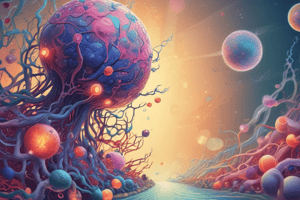Podcast
Questions and Answers
Which oncogene mutation is primarily associated with lung cancer development in smokers?
Which oncogene mutation is primarily associated with lung cancer development in smokers?
- KRAS (correct)
- BRCA1
- EGFR
- HER2
In lung cancer, which mutation is most commonly correlated with a better response to targeted therapies?
In lung cancer, which mutation is most commonly correlated with a better response to targeted therapies?
- HER2
- EGFR (correct)
- KRAS
- p53
What is the primary environmental risk factor for lung cancer?
What is the primary environmental risk factor for lung cancer?
- Genetic predisposition
- Smoking (correct)
- Obesity
- Alcohol consumption
Which mutation is often found in lung cancer cases associated with poor prognosis?
Which mutation is often found in lung cancer cases associated with poor prognosis?
What percentage of lung cancer cases is familial, often tied to inherited genetic mutations?
What percentage of lung cancer cases is familial, often tied to inherited genetic mutations?
What percentage of cancers are considered hereditary?
What percentage of cancers are considered hereditary?
Which factor accounts for the majority of cancer cases?
Which factor accounts for the majority of cancer cases?
What is the primary distinction between familial cancer and hereditary cancer?
What is the primary distinction between familial cancer and hereditary cancer?
Which genes are most commonly associated with hereditary breast and ovarian cancers?
Which genes are most commonly associated with hereditary breast and ovarian cancers?
What type of mutation is primarily linked with Lynch Syndrome?
What type of mutation is primarily linked with Lynch Syndrome?
Which mutation is commonly involved in non-small cell lung cancer (NSCLC)?
Which mutation is commonly involved in non-small cell lung cancer (NSCLC)?
What environmental factor is often implicated in contributing to sporadic cancer cases?
What environmental factor is often implicated in contributing to sporadic cancer cases?
What is a characteristic of hereditary cancer?
What is a characteristic of hereditary cancer?
Which type of genetic change is NOT mentioned in the context provided?
Which type of genetic change is NOT mentioned in the context provided?
What hypothesis correlates familial and sporadic cancer incidences?
What hypothesis correlates familial and sporadic cancer incidences?
What is an indicator of inherited cancer?
What is an indicator of inherited cancer?
What can be a reason for familial disease clusters aside from genetics?
What can be a reason for familial disease clusters aside from genetics?
Which cancer type is most commonly associated with BRCA1 and BRCA2 mutations?
Which cancer type is most commonly associated with BRCA1 and BRCA2 mutations?
Which of the following cancers is associated with Lynch Syndrome?
Which of the following cancers is associated with Lynch Syndrome?
What role do gatekeeper genes play according to the Gatekeeper Hypothesis?
What role do gatekeeper genes play according to the Gatekeeper Hypothesis?
Which of the following is NOT a type of genetic alteration mentioned?
Which of the following is NOT a type of genetic alteration mentioned?
Which type of mutation is commonly associated with KRAS mutations in cancer?
Which type of mutation is commonly associated with KRAS mutations in cancer?
Flashcards
Cancer Risk for General Population
Cancer Risk for General Population
One in three people will develop cancer at some point in their lives.
Oncogenesis
Oncogenesis
Cancer development; a multistage process where cells accumulate damage in genes involved in cell division and specialization.
Cancer as a Genetic Disease
Cancer as a Genetic Disease
Cancer is caused by genetic mutations in cells, leading to uncontrolled growth.
Hereditary Cancer
Hereditary Cancer
Cancer caused by inherited mutations in germline cells (passed down).
Signup and view all the flashcards
Sporadic Cancer
Sporadic Cancer
Cancer that occurs due to somatic mutations (acquired during a person's lifespan).
Signup and view all the flashcards
Familial Cancer
Familial Cancer
Cancers that appear more frequently in families than expected; may not be linked to a known gene mutation.
Signup and view all the flashcards
Sporadic vs. Genetic Cancer
Sporadic vs. Genetic Cancer
The vast majority of cancers are sporadic, while fewer (5-10%) are hereditary.
Signup and view all the flashcards
KRAS mutations
KRAS mutations
Mutations in the KRAS gene, commonly found in smokers, activate oncogenic signaling pathways and promote lung cancer development.
Signup and view all the flashcards
EGFR mutations
EGFR mutations
Mutations in the EGFR gene, particularly frequent in never-smokers, make tumors susceptible to EGFR-targeted therapies.
Signup and view all the flashcards
p53 mutations
p53 mutations
Mutations in the p53 gene, present in many lung cancer cases, are associated with poor prognosis.
Signup and view all the flashcards
HER2 mutations
HER2 mutations
While mainly linked to breast cancer, HER2 mutations are also found in certain lung cancers, especially in never-smokers.
Signup and view all the flashcards
Familial Lung Cancer
Familial Lung Cancer
Lung cancer occurring more frequently in families than expected, often linked to inherited mutations in genes like EGFR, TP53, and LKB1.
Signup and view all the flashcards
Knudson's Two-Hit Hypothesis
Knudson's Two-Hit Hypothesis
A theory explaining cancer development, suggesting that two genetic hits (mutations) are needed for a cell to become cancerous.
Signup and view all the flashcards
Gatekeeper Hypothesis
Gatekeeper Hypothesis
A gene called a 'gatekeeper' plays a crucial role in controlling cell growth and preventing cancer.
Signup and view all the flashcards
Types of Genetic Changes
Types of Genetic Changes
Mutations in cancer genes can include: deletions, insertions, amplifications, and chromosomal translocations.
Signup and view all the flashcards
Oncogenes, Tumor Suppressor Genes, DNA Repair Mechanisms
Oncogenes, Tumor Suppressor Genes, DNA Repair Mechanisms
Genetic changes in cancer affect genes that control cell growth, stop cell growth, and repair DNA damage.
Signup and view all the flashcards
Unusually Early Age of Onset
Unusually Early Age of Onset
A strong indicator of inherited cancer, where cancer develops at a younger age than expected.
Signup and view all the flashcards
Bilateral Tumors in Paired Organs
Bilateral Tumors in Paired Organs
Cancer in both organs of a matched pair (like both breasts) is more likely to be inherited.
Signup and view all the flashcards
Inherited Cancer vs. Shared Environment
Inherited Cancer vs. Shared Environment
Family cancer clusters could be due to genetics or shared environmental factors.
Signup and view all the flashcardsStudy Notes
Cancer Risks and Genetics
- One in three people will develop cancer at some point in their lives.
- Various factors increase cancer risk, including smoking, excess body weight, alcohol use, ultraviolet radiation, poor diet, and lack of physical activity.
- Disparities in social determinants of health may contribute to the higher prevalence of these risk factors among certain racial and ethnic minorities.
Oncogenesis
- Cancer development (oncogenesis) is a multistage process.
- During this process, cells accumulate damage in several critical genes involved in mitosis and/or cell differentiation.
Cancer as a Genetic Disease
- Cancer is caused by genetic mutations in cells.
- These mutations lead to uncontrolled cell growth.
- Mutations can be inherited (germline) or acquired (somatic).
Hereditary vs. Sporadic Cancer
- Hereditary cancers are caused by inherited genetic mutations in germline cells.
- Sporadic cancers arise from somatic mutations acquired during a person's lifetime.
- Familial cancers occur more frequently in families than expected but may not have a known genetic cause.
Genetic Cancers
- Specific types of cancers are linked to genetic mutations.
- Examples include breast, ovarian, colon, gastric, Li-Fraumeni, multiple endocrine neoplasia, neurofibromatosis, phaeochromocytoma, retinoblastoma, and Wilm's tumour.
Types of Genetic Changes
- Cancer-causing genetic changes include point mutations, deletions, insertions, amplifications, and chromosomal translocations.
- These changes affect oncogenes, tumor suppressor genes, and DNA repair mechanisms.
Knudson's Two-Hit Hypothesis
- This hypothesis explains the correlation between familial and sporadic cases of similar cancers.
- Most cancers require two mutations in a gene to cause a phenotypic change.
Gatekeeper Hypothesis
- A more recent concept in cancer genetics.
- Proposes that specific genes (gatekeepers) are crucial for maintaining a stable cell number in tissues.
- Inactivation of these genes can lead to cancer development.
Indicators of Inherited Cancer
- Several indicators suggest a genetic predisposition to cancer.
- These include multiple close relatives with the same type of cancer, two family members with the same rare cancer, unusually early age of onset, bilateral tumors in paired organs, and non-clonal tumors in various organ systems.
DNA Repair Genes and Cancer
- Mismatch repair (MMR) genes are essential for repairing DNA damage.
- Mutations in MMR genes can increase the risk of colorectal and other cancers, leading to Lynch syndrome.
- Mutations in BRCA1 and BRCA2 genes disrupt DNA repair mechanisms, and can increase the risk of breast and ovarian cancers.
Cancer Syndromes with Inherited Genetic Mutations
- Li-Fraumeni syndrome increases the risk of multiple cancers (breast, sarcoma, brain).
- Familial adenomatous polyposis (FAP) leads to the development of numerous colon polyps, which can progress to cancer.
Hereditary Breast and Ovarian Cancer
- Mutations in BRCA1 and BRCA2 genes are linked to increased risks of breast and ovarian cancers.
HER2 Amplification
- Increased HER2 levels are associated with aggressive breast cancer.
BRCA Mutations in Male Breast Cancer
- Men with BRCA1 or BRCA2 mutations are at higher risk of breast cancer, though their risk is significantly lower than that of women.
Ovarian Cancer Genetics
- Mutations in BRCA1 and BRCA2 genes significantly increase the risk of ovarian cancer, similar to their effect on breast cancer.
Lynch Syndrome and Ovarian Cancer
- Mutations in mismatch repair genes like MLH1 and MSH2 are associated with Lynch syndrome, a condition increasing the risk of ovarian and other cancers.
Lung Cancer Genetics
- EGFR mutations are common in lung cancer, especially among never-smokers or Asian populations.
- KRAS mutations promote lung cancer development, common in smokers.
- p53 mutations indicate a poor prognosis in lung cancer.
- HER2 mutations (though primarily associated with breast cancer) can appear in some lung cancer cases.
Environmental Factors and Genetic Interactions in Lung Cancer
- Smoking is a significant environmental risk factor for lung cancer.
- Genetic susceptibility also plays a role.
Familial Lung Cancer Syndromes
- Certain inherited genetic mutations in genes such as EGFR, TP53, and LKB1 can contribute to familial lung cancer.
Colorectal Cancer
- Colorectal cancer can occur sporadically or as a result of familial genetic factors like HNPCC.
HNPCC or Lynch Syndrome
- HNPCC/Lynch syndrome is one factor associated with 3-5% of colorectal cancers.
- Associated with autosomal dominant pattern of inheritance, high risk of colorectal cancer, typical onset in 40-50s, and polyps are common.
Familial Adenomatous Polyposis (FAP)
- FAP is caused by mutations in the APC gene.
- These mutations lead to the development of numerous polyps in the colon that can progress to cancer if not managed.
Studying That Suits You
Use AI to generate personalized quizzes and flashcards to suit your learning preferences.





